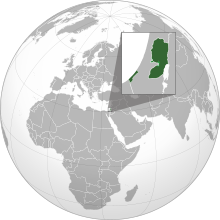Palestine
Jump to navigation
Jump to search
English
Alternative forms
Etymology
From Middle English Palestyne, from Old English Palestina, from Latin Palaestīna (“Roman province of Palestine”), from Ancient Greek Παλαιστίνη (Palaistínē, “Philistia and the surrounding region”), from Hebrew פְּלֶשֶׁת (p'léshet, “Philistia, land of the Philistines”).[1][2] The term P-l-s-t or P-r-s-t, found in five Ancient Egyptian inscriptions (beginning with one at Medinet Habu from circa 1170 BCE and ending with Padiiset's Statue inscription from circa 900-850 BCE) as the name of a people near Egypt, is traditionally taken to be cognate.[3][4] Seven Assyrian inscriptions contain the word "Palas(h)tu" or "Pilistu", which is usually also taken to be cognate.[5][6]
Pronunciation
- IPA(key): /ˈpæləˌstaɪn/
- IPA(key): /ˈpæləˌstiːn/ (chiefly U.S. place names)
Audio (Southern England): (file)
Proper noun
Palestine



- A country in Western Asia, in the Middle East; the State of Palestine; the homeland of the Palestinian people.
- 2019 July 17, Talia Levin, “When Non-Jews Wield Anti-Semitism as Political Shield”, in GQ[1]:
- Jews and Israel are not synonymous; nor is support for Palestine synonymous with anti-Semitism; nor is questioning the orthodoxy of the Republican party, which the majority of us do with relish, an insult to Jewry.
- (sometimes strictly) The West Bank and Gaza Strip.
- The region in Western Asia in the Middle East between the Mediterranean Sea and the Jordan River.
- 2019 July 15, Greg Afinogenov, “The Jewish Case for Open Borders”, in Jewish Currents[2], number Summer 2019:
- Most Zionists hoped for a state of their own, but early in the 20th century, writers like Hillel Solotaroff and Chaim Zhitlowsky, both Yiddish-speaking immigrant intellectuals in New York, imagined another alternative: a federation of self-governing anarchist communes in Palestine that would defend Jewish life without relying on state power.
- (historical, technical) A British colonial entity administering approximately the lands mentioned in definition 1.
- (historical, technical, rare) The British League of Nations Mandate for Palestine, of which this region was a part (the remainder being Transjordan, which covered approximately the lands of the modern Kingdom (originally Emirate) of Jordan).
- (historical) Any of four Ancient Roman and Byzantine provinces in the eastern Mediterranean: Syria Palaestina, Palaestina Prima, Palaestina Secunda and Palaestina Salutaris.
- A number of places in the United States:
- A town in St. Francis County, Arkansas.
- A community of Newtown, Fairfield County, Connecticut.
- A village in Crawford County, Illinois.
- A township in Woodford County, Illinois.
- An unincorporated community in Brookville Township, Franklin County, Indiana.
- An unincorporated community in Harrison Township, Kosciusko County, Indiana.
- An extinct town in Shawswick Township, Lawrence County, Indiana.
- A township in Story County, Iowa.
- A township in Cooper County, Missouri.
- A village in Darke County, Ohio.
- A city, the county seat of Anderson County, Texas, United States.
- An unincorporated community in Greenbrier County, West Virginia.
- An unincorporated community in Wirt County, West Virginia.
- A community in the City of Kawartha Lakes, Ontario, Canada.
- A village in Over Wallop parish, Test Valley district, Hampshire, England (OS grid ref SU2640).
Usage notes
- (region): The use of Palestine to refer to the region between the Jordan River and the Mediterranean Sea has been, since the latter half of the 20th century, sometimes seen as politically or emotionally charged; indeed, this is true of all terms for this region.
Synonyms
- (the region): Canaan, the Holy Land, Israel, the Land of Israel
- (Roman or Byzantine province): Palaestina
- (country): State of Palestine, Filastin
Derived terms
- East Palestine (Ohio)
- Little Palestine
- New Palestine
- Palestinian
- Fakestine (offensive)
Related terms
Descendants
Translations
geographic region
|
West Bank and Gaza Strip collectively
|
historical: Roman province
|
historical: former British entity
|
historical: former British Mandate
|
- The translations below need to be checked and inserted above into the appropriate translation tables. See instructions at Wiktionary:Entry layout § Translations.
Translations to be checked
See also
References
- Douglas Harper (2001–2024) “Palestine”, in Online Etymology Dictionary.
- ^ “Palestine”, in Dictionary.com Unabridged, Dictionary.com, LLC, 1995–present.
- ^ Martin Sicker, Reshaping Palestine (1999, →ISBN, page ix: The name Palestine has its origin in the Hebrew Peleshet, first mentioned in the Bible (Exodus 15:14) in reference to the land of the Pelishtim, or Philistines, one group of the Sea Peoples that invaded the region during the early biblical period.
- ^ Geoffrey W. Bromiley, The International Standard Bible Encyclopedia, volume 4 (1995, →ISBN, page 43
- ^ Ann E. Killebrew, The Philistines and Other “Sea Peoples” in Text and Archaeology (2013)
- ^ Gösta W. Ahlström, The History of Ancient Palestine from the Palaeolithic Period to Alexander's Conquest
- ^ The Oxford Handbook of the Archaeology of the Levant: c. 8000-332 BCE (2014, →ISBN, The first Assyrian reference to 'palashtu' or 'Philistia' appears in Adad-nirari III's inscriptions where, in the Stone Slab, he claims to have subdued Amurru in its entirety, defining it as, 'Tyre, Siden, Humri (Israel), Edom, Palashtu, as far as the great sea of the setting sun', and imposed tax and tribute upon them (Grayson 1996: 212–13).
Anagrams
French
Alternative forms
Pronunciation
Proper noun
Palestine f
- Palestine (a region of Western Asia, in the Middle East)
- Palestine (a country in Western Asia, in the Middle East)
Derived terms
Noun
Palestine f (uncountable)
- (printing, dated) double pica (large size of type standardized as 24 points)
Descendants
Anagrams
Categories:
- English terms inherited from Middle English
- English terms derived from Middle English
- English terms inherited from Old English
- English terms derived from Old English
- English terms derived from Latin
- English terms derived from Ancient Greek
- English terms derived from Hebrew
- English 3-syllable words
- English terms with IPA pronunciation
- English terms with audio links
- English lemmas
- English proper nouns
- English uncountable nouns
- en:Palestine
- en:Countries in Asia
- en:Countries
- English terms with quotations
- en:Regions of Asia
- English terms with historical senses
- English technical terms
- English terms with rare senses
- en:Places in the United States
- en:Towns in Arkansas, USA
- en:Towns in the United States
- en:Places in Arkansas, USA
- en:Villages in Connecticut, USA
- en:Villages in the United States
- en:Places in Connecticut, USA
- en:Villages in Illinois, USA
- en:Places in Illinois, USA
- en:Townships
- en:Unincorporated communities in Indiana, USA
- en:Unincorporated communities in the United States
- en:Places in Indiana, USA
- en:Historical settlements
- en:Places in Iowa, USA
- en:Places in Missouri, USA
- en:Villages in Ohio, USA
- en:Places in Ohio, USA
- en:Cities in Texas, USA
- en:Cities in the United States
- en:County seats of Texas, USA
- en:Places in Texas, USA
- en:Unincorporated communities in West Virginia, USA
- en:Places in West Virginia, USA
- en:Villages in Ontario
- en:Villages in Canada
- en:Places in Ontario
- en:Places in Canada
- en:Villages in Hampshire, England
- en:Villages in England
- en:Places in Hampshire, England
- en:Places in England
- French 3-syllable words
- French terms with IPA pronunciation
- French terms with audio links
- French lemmas
- French proper nouns
- French feminine nouns
- fr:Regions of Asia
- fr:Palestine
- fr:Countries in Asia
- fr:Countries
- French nouns
- French uncountable nouns
- fr:Printing
- French dated terms
